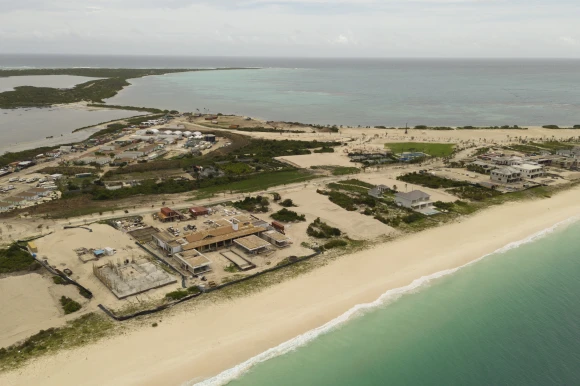ST. JOHN’S (AP) — Construction of two private villas inside a national park in Barbuda has sparked the latest environmental legal fight between angry residents and wealthy foreigners seeking to develop the Caribbean island with support from the government.
George Jeffery, a local fisherman and tour guide, and the U.K.-based nonprofit Global Legal Action Network filed a lawsuit Thursday against the government of the twin-island nation of Antigua and Barbuda.
The suit seeks to overturn the construction permit because the island’s Development Control Authority approved the high-end development despite the national environmental department rejecting the proposal twice.
The legal fight comes on the heels of another case in which Barbudan residents and Global Legal Action Network are opposing construction of hundreds of luxury residences, an 18-hole golf course, a beach club and a natural gas storage facility on more than 600 acres (240 hectares) of protected wetland in Barbuda.
In the new lawsuit, Gearóid Ó Cuinn, director of Global Legal Action Network, said, “This small island nation is under-resourced and faces an enormous fight against wealthy foreign developers.”
Ó Cuinn and Jeffery are asking the Eastern Caribbean Supreme Court in St. Lucia to quash the permit that officials awarded in May 2022.
Officials with Abercorn Trust Inc., which is building the project, could not be immediately reached for comment about the suit, and the government’s Development Control Authority did not return a message for comment.
Construction already has started on the project, which envisions two luxury homes of at least 15,000 square feet each along with swimming pools, tennis courts and a helicopter pad at the site in northwestern Barbuda.
The site covers 114 acres (46 hectares) on the fringes of Codrington Lagoon National Park, a protected wetland that is home to a frigate bird sanctuary, a turtle nesting site and endangered species including the upside-down jellyfish, the West Indian whistling duck and the Barbudan warbler, according to court documents.
“Wetlands are the most effective natural carbon sinks on the planet protecting humanity from climate change,” Ó Cuinn said.
In reviewing the proposal, Antigua and Barbuda’s Department of the Environment said it “cannot recommend approval for this development, nor for any other development in this sensitive protected area.” It said it feared the project would set a precedent for further developments in the protected area.
Sarah O’Malley, a lawyer with Global Legal Action Network, said in a phone interview that the site contains a nearly 100-acre security buffer to keep people out of the area, which includes part of the lagoon.
“They are really sensitive to it because it’s their main source of water, it’s their main source of food,” she said. “Up to this point, it’s been completely undeveloped.”
Jeffery, the fisherman and tour guide, noted in his affidavit the lagoon is a “crucial ecosystem” that serves as a nursery for marine life.
The company that prepared environmental impact statements for Abercorn Trust said that it did not expect “major impacts” on the frigate bird colony given its distance from the site and that no activity is proposed in the lagoon.
Jeffery rejected the statement, saying “since construction began, I have noticed the damage and deterioration being caused to the area.”
O’Malley said a wealthy British investor, Henry Anderson, is the person behind Abercorn Trust. Local media reports, citing Barbuda council members, said Anderson initially claimed the project was for British royalty.
Anderson could not be reached for comment.
By DÁNICA COTO/Associated Press

